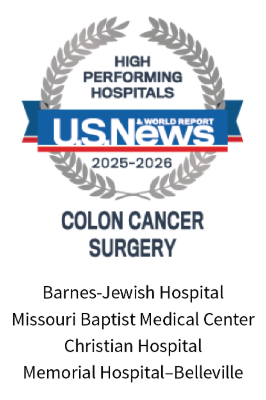BJC HealthCare offers excellent care for colorectal cancer, at any stage. Our Siteman Cancer Center at Barnes-Jewish Hospital and WashU Medicine, along with its five satellite locations, is designated a Comprehensive Cancer Center by the National Cancer Institute (NCI).
In addition to Siteman locations, BJC HealthCare offers comprehensive and convenient care in locations across the region. Our Missouri Baptist Medical Center program is ranked among the top regional hospitals by U.S. News & World Report as high performing in colon cancer surgery and is nationally accredited by the Commission on Cancer (CoC).
We combine a comprehensive and multidisciplinary approach, research, and clinical excellence in locations designed by patients, doctors, and nurses. Decades of experience has taught us that when treating cancer, comfort and compassion are just as important as the science of medicine.
When you to come to us for colorectal cancer care, you can expect:
- A reputation for excellence: Siteman Cancer Center provides access to superior care close to home. Siteman is consistently ranked as one of the top 10 cancer centers in the nation by U.S. News & World Report. Missouri Baptist Medical Center is also ranked among the top regional hospitals by U.S. News & World Report as high performing in colon cancer surgery.
- Pioneering treatments: We have innovative treatment options for every stage of colorectal cancer. We perform minimally invasive surgeries that reduce the risk of long-term side effects. And we are on the forefront of new immunotherapy medications that provide hope for people with cancer that has spread to other parts of the body.
- Genetic testing and counseling: Genetic conditions that run in families are responsible for about 6% of colorectal cancers. We provide testing and counseling for you and your family to help assess risk and guide your treatment.
- Research and clinical trials: Our doctors participate in leading-edge clinical trials that help us improve treatment options. If you qualify, participating in a clinical trial allows you to receive promising new therapies not yet available elsewhere. Learn more about clinical trials at BJC HealthCare.
- Comprehensive, supportive care: Our compassionate colorectal cancer care team includes support for you and your family. We’re here to help you navigate every step of your treatment. Along the way, our cancer support services team provides nutritional counseling, emotional support, palliative care, and more.

